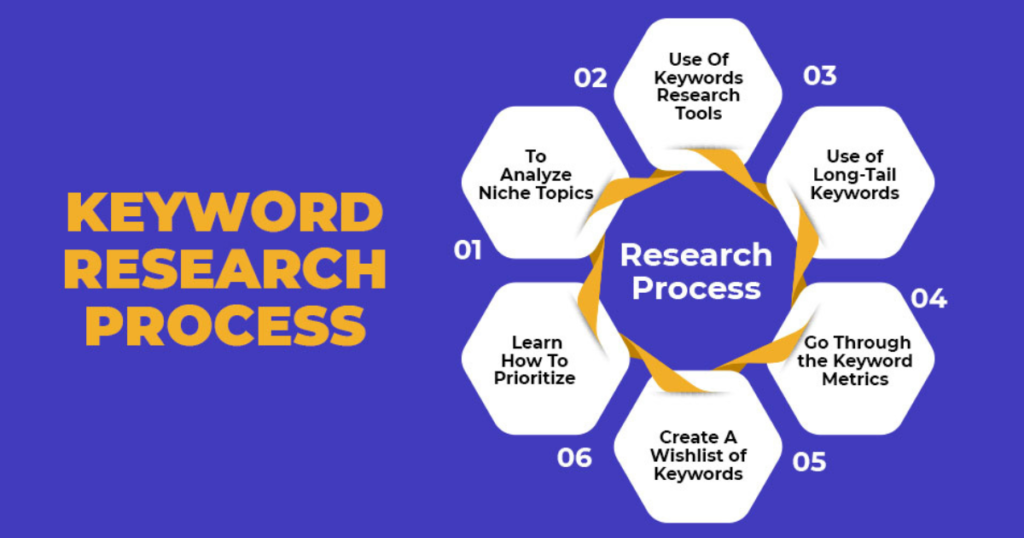
Why is Keyword Research Important for SEO?

SEO means making your website better so that people can find it on Google. Many things are part of SEO, like website speed and backlinks. But one very important part is keyword research.
Keyword research means finding the words and phrases that people type in Google. These words are called keywords. If you know the right keywords, you can write better content and bring more visitors to your website.
Here are 5 very simple reasons why keyword research is important:
1. Know What People Want
Keyword research helps you understand what people really search on Google. For example, if many people are typing “best email marketing software”, then you know this is a popular topic. This way, you write content on things that people actually need, not just what you imagine.
2. See Who You Compete With
By doing keyword research, you can see which websites are already ranking for the keyword. For example, if you want to rank for “landing page builder”, you will find which companies are already on top. This shows you if the keyword is easy or hard for your website.
3. Find Easy (Low Competition) Keywords
Some keywords are too hard because big and strong websites already use them. Keyword research helps you find easier keywords (low competition) where you can also rank. For example, instead of “free keyword research tools” (hard), you can write about “free keyword research tools for SEO” (easier). This is good especially if your website is new.
4. Match Search Intent
Search intent means the reason why people search online. Some people want to buy, some want to learn, and some want to compare. For example, if someone types “landing page builder”, Google shows many tools because people want software. If you understand search intent, you can write content that matches what people really want.
5. Get New Content Ideas
Sometimes you don’t know what topic to choose for your blog. Keyword research gives you new ideas. For example, you can check which keywords your competitors are using and then create your own content on similar topics. This way, your website always has fresh and helpful articles.
Easy Keyword Research Tips for New Websites

1. Use Keyword Clusters on One Page
Keyword clusters mean using many similar keywords together in one article. For example, “SEO tools for eCommerce websites,” “SEO tools for online stores,” and “SEO software for online shops” all have the same meaning but are written differently. Instead of making a separate page for each keyword, it is better to put them together on one page. This way, your page looks stronger to Google and can rank better.
2. Check Google Suggest
When you type something in the Google search box, you will see extra suggestions. These suggestions show what people are actually searching for. For example, if you type “SEO tools,” Google might suggest “SEO tools for beginners” or “SEO tools free.” You can use these suggestions as your keywords because they come directly from real searches.
3. Look at “People Also Ask”
On Google, there is a section called People Also Ask. It shows the most common questions related to your keyword. For example, if you search “SEO tools,” you may see questions like “What is the best free SEO tool?” or “Which SEO tool is easy for beginners?” You can create content by answering these questions. This is a smart way to reach more people because you give answers they are already looking for.
How to Do Keyword Research Step by Step

Keyword research means finding the best words that people type in Google. If you use the right words, more people can visit your website. Here are 5 easy steps for beginners:
Step 1: Think of Topics and Simple Keywords
First, write down the main topics of your website. For example, if your website is about fitness, your topics can be “exercise,” “healthy food,” and “weight loss.” Now choose simple words for each topic. These are called seed keywords. Example: “workout,” “diet,” or “yoga.” Later, you can make longer keywords like “easy yoga for beginners” or “healthy diet tips.”
Step 2: Use Keyword Tools
After you find your simple words, use keyword tools to get more ideas. Free tools like Google Keyword Planner, Ubersuggest, and Moz Free Tool can help you. They tell you how many people search for a word and how difficult it is to rank. Paid tools like Ahrefs and SEMrush give more detailed results, but for beginners, free tools are enough.
Step 3: Check the Search Intent
Search intent means the reason why people are searching. Some people want to learn something (informational), some want to buy something (transactional), and some want to compare products or services (commercial). For example, “how to lose weight fast” means people want to learn, while “best weight loss program” means they are comparing. You should make content that matches the reason people search.
Step 4: Choose the Best Keywords
You cannot target all keywords, so you must choose the best ones. Look at three things: how many people search for it (search volume), how easy or hard it is to rank (difficulty), and if it matches your website topic (relevance). If your website is new, choose long-tail keywords like “easy yoga poses for beginners at home” because they are less competitive and easier to rank.
Step 5: Plan Your Content
After choosing your keywords, plan your content. Each blog post or page should focus on one main keyword and a few related ones. For example, if your keyword is “best diet for beginners,” write a blog post with that title. Over time, as you create more posts with different keywords, your website will cover many topics and start ranking higher on Google.
What Is Keyword Research for Small Businesses?

Keyword research means finding the exact words people type in Google when they are looking for your products or services. These words are called keywords. They are very important for SEO because they help your website appear in search results.
For small businesses, the best keywords are usually long-tail keywords. These are longer phrases like “best wedding cakes in Toronto” instead of just “cakes”. Long-tail keywords are less competitive and easier for small businesses to rank for.
Best Free Tools for Keyword Research in SEO

Google Keyword Planner is a free tool by Google. It shows keyword ideas, search volume, and how hard they are to rank. It’s simple and very useful for beginners.
Ubersuggest is another free tool. It gives you keyword ideas, traffic details, and even content suggestions. It’s easy to use and beginner-friendly.
Answers the Public turns Google questions into keyword ideas. It helps you know what people are asking online, which is great for creating blogs and FAQs.
Google Trends shows which keywords are becoming more popular over time. It helps you choose trending topics for your content.
Best Paid Keyword Research Tools for SEO
Ahrefs is one of the most powerful SEO tools. It helps with keyword research, backlinks, content ideas, and website audits. The starting price is $99 per month, but it gives very deep insights.
SEMrush is very similar to Ahrefs. It also has PPC and marketing features. Many professionals use it to manage SEO for clients.
Keyword Insights is a smart tool. It groups similar keywords together and shows search intent. This helps you write connected content and build topical authority.
Keywords Everywhere is a browser extension. It shows search volume, competition, and related keywords directly on Google when you search.
Suggested SEO Tool Stack
A great combination is Ahrefs + Keyword Insights. Ahrefs helps with all parts of SEO such as keywords, backlinks, and technical audits. Keyword Insights helps you create keyword clusters and organize your content into strong topics.
How to Use Keyword Research Tools
Expanding Seed Keywords means starting with a basic keyword (like “cakes”) and finding related ones (like “best birthday cakes” or “cheap cakes near me”).
Content Gap Analysis means checking what keywords your competitors rank for, but you don’t. You can then create content to fill those gaps.
Using AI for Ideas means letting tools suggest new keyword ideas automatically. AI can give you keywords that you may not think of on your own.
Do I need to pay for keyword tools?
No. You can start with free tools like Google Keyword Planner or Ubersuggest. Paid tools give more details, but free ones are fine for beginners.
Which tool is best for small businesses?
Google Keyword Planner and Ubersuggest are good free tools. If you have money, Ahrefs is the best paid tool.
What are keyword clusters?
Keyword clusters are groups of similar keywords. They help you make strong content that covers a full topic.
How do I know which keyword to choose?
Pick keywords that match your business, have some searches, are not too hard, and show buying intent (like “buy shoes online”)
Conclusion
Keyword research is very important for small businesses. It helps you find the right words people search on Google. Free tools are great for starting, and paid tools give more details if you have a budget. Always choose keywords that match your business, have good search numbers, and are not too hard to rank. With smart keyword use, even small businesses can get more visitors and more sales.



